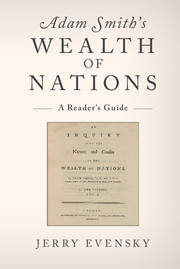Book contents
- Frontmatter
- Contents
- Acknowledgments
- Prologue: The Purpose of This Work
- 1 Adam Smith's Moral Philosophical Vision: The Context of His Economic Analysis
- 2 The Wealth of Nations: Book I
- 3 The Wealth of Nations: Books II and III
- 4 The Wealth of Nations: Book IV
- 5 The Wealth of Nations: Book V
- Epilogue: Adam Smith and Laissez-Faire
- References
- Index
2 - The Wealth of Nations: Book I
Published online by Cambridge University Press: 05 September 2015
- Frontmatter
- Contents
- Acknowledgments
- Prologue: The Purpose of This Work
- 1 Adam Smith's Moral Philosophical Vision: The Context of His Economic Analysis
- 2 The Wealth of Nations: Book I
- 3 The Wealth of Nations: Books II and III
- 4 The Wealth of Nations: Book IV
- 5 The Wealth of Nations: Book V
- Epilogue: Adam Smith and Laissez-Faire
- References
- Index
Summary
Of the Causes of Improvement in the productive Powers of Labour, and of the Order according to which its Produce is Naturally distributed among the different Ranks of the People
CHAPTER 1: “OF THE DIVISION OF LABOUR”
Smith believes that a key to material progress is increasing productivity. So, what better place to start his Inquiry into the Nature and Causes of the Wealth of Nations than with these words:
The greatest improvement in the productive powers of labour, and the greater part of the skill, dexterity, and judgment with which it is any where directed, or applied, seem to have been the effects of the division of labor. (WN, 13)
The basic principles of the division of labor are straightforward: by focusing on one task, individuals enhance their “dexterity,” save time “commonly lost in passing from one species of work to another,” and become more inventive (WN, 17). Each of these advantages increases individuals’ productivity.
The role of the division of labor in making possible our material well-being is obvious if we simply reflect on our own experience. Consider “[t]he woollen coat” of “the most common artificer or day-labourer in a civilized and thriving country” …
and you will perceive that the number of people of whose industry a part, though but a small part, has been employed in procuring him this accommodation, exceeds all computation. The woollen coat, for example, which covers the day-labourer, as coarse and rough as it may appear, is the produce of the joint labour of a great multitude of workmen. (WN, 22)
He proceeds to imagine the “great multitude of” invisible hands that played a part in producing this very common item including, among the many cited:
ship-builders, sailors, sail-makers, rope-makers, [who] must have been employed in order to bring together the different drugs made us of by the dyer, which come from the remotest corners of the world!
- Type
- Chapter
- Information
- Adam Smith's Wealth of NationsA Reader's Guide, pp. 17 - 63Publisher: Cambridge University PressPrint publication year: 2015

